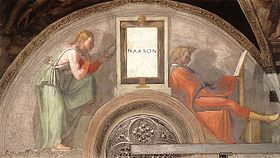- Nahshon
-
This article is about the Biblical figure. For other uses, see Nahshon (disambiguation).
Nahshon (Hebrew: נַחְשׁוֹן) or Naḥshon ben ʿAmminadabh (נחשון בן עמינדב; "Nahshon son of Aminadav") was, according to the Book of Exodus, the son of Amminadab; descendant in the fifth generation of Judah, brother-in-law of Aaron[1] and an important figure in the Hebrew's Passage of the Red Sea which according to the Jewish Midrash he initiated by walking in head deep until the sea split. The popular Yiddish saying "to be a Nachshon" means to be an "initiator."
Contents
Biblical data
According to Num i. 7, he is at least 20 years old during the census in the Sinai, at the beginning of The Exodus. By the same account of The Exodus then, Nahshon did not survive the forty year sojourn in the wilderness to enter the Promised Land.
Nahshon was appointed by Moses, upon God's command, as prince of the Tribe of Judah, and though his tribe was fourth in the order of the Patriarchs, yet at the dedication of the Tabernacle he was the first to bring his dedicatory offering.[2] Nahshon was, through Boaz, the ancestor of David.[3]
Nahshon is also mentioned in the Greek New Testament in the genealogy of Jesus of Nazareth, called the Messiah (Matthew 1:4 and Luke 3:32).
In rabbinical literature
Owing to his direct descent from Judah and to his being the progenitor of so many kings, Nahshon is extolled by the rabbis as a most noble man. Nahshon's sister Elisheba married Aaron,[4] and this is especially mentioned as a hint that one should take care to select a wife whose brothers are noble.[5] The Midrash relates that during the Exodus, when the Israelites reached the Red Sea, it did not automatically part. The Israelites stood at the banks of the sea and wailed with despair, but Nahshon entered the waters. Once he was up to his nose in the water, the sea parted. This is the origin of his name "Nahshol" = "stormy sea-waves". It is in virtue of action that he was chosen to be the first to bring the dedicatory offering.[6] Nahshon was a model prince,[7] and was called "king".[8] When the princes of the different tribes were required to bring their offerings, each on a separate day, Moses was embarrassed, not knowing who should be the first; but all Israel pointed at Nahshon, saying, "He sanctified the name of God by springing first into the Red Sea; he is worthy to bring down the Shekhinah; therefore he shall be the first to bring the offering."[9] The offering brought by Nahshon is pointed out as having been his own and not that of his tribe.[10] In the account of the offering the words Va'korbano ("and his sacrifice") and Etodim each have a ו, while the same words in the accounts of the other princes' offerings have no ו. This letter, the numerical value of which is six, indicates that Nahshon was the ancestor of six men — David, the Messiah, Daniel, Hananiah, Mishael, and Azariah — each of whom was distinguished for six praiseworthy qualities.[11]
See also
- Midrash
- Torah
- Tanakh
- Rabbinic literature
- Operation Nachshon (named after this biblical figure Nachshon ben Aminadav)
References
This article incorporates text from the 1901–1906 Jewish Encyclopedia, a publication now in the public domain.
Adam to David according to the Hebrew Bible Creation to Flood Cain line Patriarchs after Flood Nationhood to Kingship Categories:- Torah people
- Biblical characters in rabbinic literature
- Yiddish words and phrases
Wikimedia Foundation. 2010.

